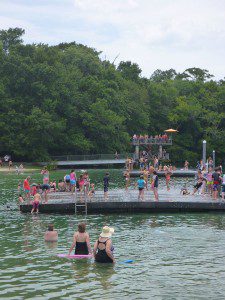The Sharing Water Conference will be held at the Monticello Opera House on October 2 - 4. All events are free, though conference organizers encourage registration to ensure a spot.
Rob Diaz de Villegas WFSU-TV
Jack Carswell went to FSU in the 1950s. Once, sitting in a lecture hall, Jack heard a professor tell his class that a rocket could never maintain a speed great enough to escape the earth’s gravitational pull. “And there I was a few years later, sitting on my porch and looking for Sputnik.” Jack was sitting the in the WFSU lobby his fellow Main Street Monticello members, talking about water issues. He was making a parallel between the seemingly unsolvable tensions between urban growth, agricultural needs, and natural resources like springs. Aeronautical engineers figured out that they could mount one rocket onto another rocket, and ignite the second one once they were in flight to get the burst they needed. Jack is sure that this innovative thinking was a result of one engineer talking the problem through with other engineers. At the The Sharing Water Conference this week in Monticello, Jack hopes that similar conversations might take place as people discuss the future of the Floridan Aquifer.

Wakulla Spring is one of our area’s top tourist attractions, and it supports a diverse ecology as the source of the Wakulla River. However, water usage in the Wakulla springshed, which includes Tallahassee, may be degrading the quality of its water. Elevated nitrate levels have increased algae, and more dark water days have curbed the once popular glass bottom boat tours.
Taking place over three days (Thursday, October 2 through Saturday, October 4) in the Monticello Opera House, the conference will bring together geologists, lawyers, policy makers, water managers, farmers and other stakeholders to discuss a variety of issues. Just as the Floridan Aquifer is vast and complex, so too are the water needs of Florida, Georgia, and Alabama, under which the aquifer sits.
This is the water we drink. It’s the water you swim in at Wakulla Springs, kayak over on the Wacissa River, and it provides some of the freshwater needed to sustain estuaries for seafood species in Apalachee Bay. We take our water’s quantity and quality for granted,but there are issues that threaten both.
Here is a brief look at the event:
- Confirmed speakers/ panelists include State Senator Bill Montford, State Representative and President of Simpsons Nursery Halsey Bashears, Audubon Florida Executive Director Eric Draper, and the executive directors of the Southwest Florida & Suwannee River Water Management Districts.
- Day one covers the basics of water supply: how the aquifer works, how it is managed, and groundwater depletion. This is the more technical day of the event, but I wouldn’t let that scare you off. If you’re going to understand the policy, it helps to know the science.
- Day two looks at the people side of the equation: affected groups (represented by public utilities, agriculture, industry, and environmental groups), solutions to water issues, and the Tampa area water crisis.
- Day three gets a little more “hands on.” After an address by Senator Montford, there will be a field trip to Monticello’s wastewater treatment facility, where water is treated and used at Simpsons Nursery. This project is meant to offset half-a-million gallons of groundwater (aquifer) withdrawals a day by the nursery, where the tour will conclude.
- On day three, from 8 am to 4 pm, there will also be an exhibit called Water Ventures, a mobile learning lab meant to engage elementary school students to learn about biodiversity, hydrology, and watershed stewardship. Conference organizer Dr. Anne Holt told me “they say it’s for fourth graders, but I think it would be interesting for anyone.” I get what she’s saying. For a lot of people, technical terms and lingo like confined and unconfined aquifer, groundwater, gray water, etc. can leave the layperson confused. This truck tackles a lot of that content visually, perhaps making it more real for those of us have to see things in our heads to “get it.”
- Every meeting and panel discussion will be recorded and archived. This is the plan going forward for what will be a biennial event. Conference organizers are excited about the prospect of accumulating the knowledge and discourse shared over the years.
